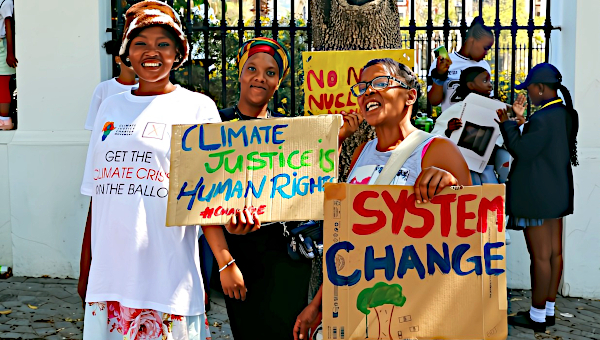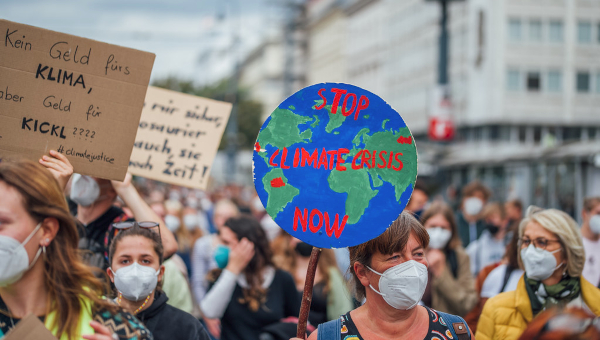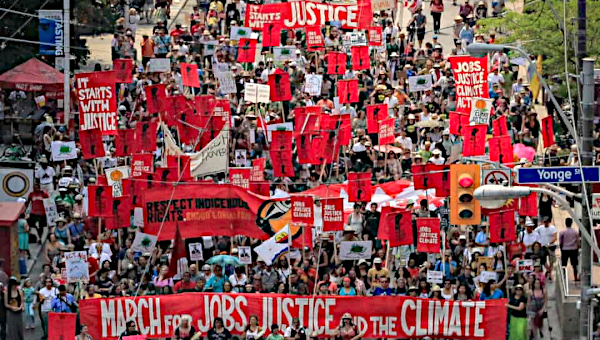Cochabamba: Climate Justice Has a New Program and New Hope for Victory
On April 22, a mass international assembly in Cochabamba, Bolivia, adopted a charter for action to protect our planet from ecological devastation.
Following the failed climate negotiations in Copenhagen in December, where Barack Obama tried unsuccessfully to impose a toothless backroom deal, Bolivian President Evo Morales invited “the peoples of the world, social movements and Mother Earth’s defenders, … scientists, academics, lawyers and governments,” to attend a conference “to define strategies for action and mobilization to defend life from Climate Change and to defend Mother Earth’s Rights.”

That call struck a chord with activists around the world. Despite the volcanic ash that prevented many European delegations from attending, more than 30,000 people from over 100 countries took part in the World People’s Conference on Climate Change and the Rights of Mother Earth in the central Bolivian city of Cochabamba, April 19-22. The participants included more than 40 official government delegations and thousands of activists and representatives of social movements.
Particularly notable was the large number of Indigenous people from throughout South and North America, who played leading roles in defining the meeting’s environmental philosophy and drawing up a program for action. Morales urged the delegates to commit to learn and benefit from the wisdom of the world’s indigenous peoples. “The peoples of the Andes believe in the concept of ‘living well’ instead of wanting to ‘live better’ by consuming more regardless of the cost to our neighbors and our environment.”
Cochabamba Protocol
Over three days and nights of intensive discussions in 17 working groups, the participants drafted a People’s Agreement that some are calling the “Cochabamba Protocol.” It places responsibility for the climate crisis on the capitalist system and on the rich countries that “have a carbon footprint five times larger than the planet can bear.”
The People’s Agreement calls on developed countries to cut domestic emission reductions to 50% below 1990 levels by 2017, and to create a “transparent and equitable” Adaptation Fund to compensate developing countries for the destruction caused by climate change.
It rejects the use of market mechanisms, in particular the World Bank’s REDD (Reducing Emissions from Deforestation and Forest Degradation) program, which purports to pay governments and companies in the South for not cutting down forests. The best way to protect forests, the Agreement says, is “to recognize and guarantee the collective rights of lands and territories, especially considering that most of the forests and jungles are in the territories of indigenous peoples and nations, and traditional farming communities.” It calls for full implementation of the U.N. declaration on Indigenous Peoples Rights, which neither the U.S. or Canada have signed.
In view of the failure of many countries (including Canada) to honour their commitments under the Kyoto Accord, the meeting in Bolivia proposes creation of “an International Court of Climate and Environmental Justice which will have binding legal capacity to prevent, prosecute and punish States, companies and people who by act or omission cause contamination and climate change.”
And in response to the efforts of the U.S. and other countries to limit climate negotiations to a hand-picked group of so-called world leaders, the Conference calls for a worldwide “people’s referendum” on climate change, in which everyone can vote on emission reduction targets, the creation of a Climate Justice Court, the need for a Universal Declaration of the Rights of Mother Earth, and the need to change the capitalist system.
The organizers of the World People’s Conference on Climate Change and the Rights of Mother Earth are determined that the resolutions adopted in Cochabamba be put into action, in two parallel ways.
On one hand, the resolutions will become part of negotiations for a new climate treaty, Evo Morales told the delegates that the eight member countries of the Bolivarian Alliance for the Peoples of Our America (ALBA) will go to the next round of international climate negotiations in Cancun Mexico, in December, with a submission that is “based on … the proposals that came out of the seventeen working groups of the Cochabamba conference.”
As Venezuelan president Hugo Chavez said at the final session of the conference:
“In Cancun we cannot permit the imperial dictatorship to impose itself. We must go to Cancun to continue the battle of Copenhagen with greater fury… we are not going to allow the imposition of a document that does not include the voices of the people.”
At the same time, the Cochabamba meeting is a major step toward building a mass democratic movement against climate change. The resolutions adopted in Bolivia provide a programmatic basis for such a movement – but more importantly, the thousands of young activists who attended are returning invigorated and excited about building a movement in the streets.
As noted U.S. environmentalist Bill McKibben wrote on Earth Day, mainstream environmentalism “no longer does enough real organizing to build the pressure that could result in real change.” The impetus to change that will come from young activists, armed with a new vision of a mass movement that has the potential to force governments to adopt and implement concrete changes to cut emissions.
As Kimia Ghomeshi of the Canadian Youth Climate Coalition writes:
“I also feel incredibly empowered because what I am seeing before me, here in Cochabamba, is a truly global resistance. A resistance to the world’s greatest polluters – polluters who refuse to accept their responsibility for causing this global catastrophe. And this movement is building, becoming more tactful, more united, more committed, with a common vision: Systems change, not climate change.”
Ghomeshi will be one of the speakers at a “Report Back from Cochabamba” meeting in Toronto on May 7 [see video]. Such activists, and the movement building that such meetings can initiate, are the best hope we have that the planet can be saved. •
For further information:
- The Cochabamba Protocol: People’s Agreement on Climate Change and the Rights of Mother Earth
- Indigenous Peoples’ Declaration
- Report Back from Cochabamba, Toronto, May 7: Facebook event
- Text of People’s Agreement (in Spanish)
- Climate and Capitalism articles on Cochabamba
- Toronto Bolivia Solidarity
U.N. Ambassador Pablo Solon, from Bolivia, is inviting all the governments of the world and interested NGOs to a conference, on April 20 to 22, 2010, to discuss the “Structural Changes for the Environment”.





